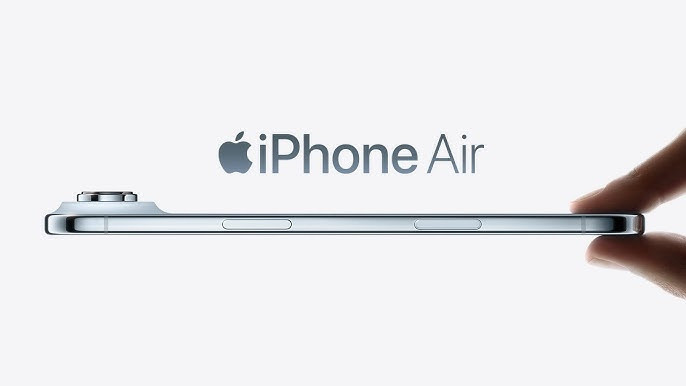Why You Still Can't Order the iPhone Air in China — And How Beijing's eSIM Approval Plays a Role
While the iPhone 17 models are on track for their scheduled release, the iPhone Air's rollout in the mainland is pending

The highly anticipated iPhone Air has arrived, but a key market is still waiting. While Apple's thinnest-ever device is launching around the world, consumers in China are left in limbo.
The delay isn't a simple logistical hiccup; it's a direct result of the phone's most innovative feature— its eSIM-only design — and the intricate world of Beijing's technology regulations.
The eSIM Hurdle: What's Really Holding Up the Launch?
Apple's new iPhone Air, its thinnest model yet, will likely face shipment delays to China while the company works with authorities there to resolve regulatory issues concerning its embedded SIM. Apple has now changed the iPhone Air's ordering details for mainland China, swapping the original launch timeline with a notice that 'release information to be updated later' as of Friday morning.
Previously, the company had announced that pre-orders would begin at 8 p.m. local time on Friday, with deliveries starting on 19 September. Due to its slim 5.6mm design, the iPhone Air requires an eSIM. According to a post on Apple's website, only the iPhone Air, model A35181, supports this technology in mainland China.
The company explains that 'All other iPhone models, including those purchased outside of China mainland, are unable to install an eSIM profile from carriers in China mainland.'
According to Apple's website, the other new models unveiled earlier this week — the standard iPhone 17, the iPhone 17 Pro and the iPhone 17 Pro Max — are still scheduled to be released on 19 September, with pre-orders starting Friday evening.
The Regulatory Maze: Navigating China's Approval Process
Apple representatives informed Chinese media that it was 'working closely with regulatory authorities to bring it to China as soon as possible'.
China Telecom said its eSIM service for smartphones is fully ready, waiting final approval from the MIIT for commercial trial before becoming available for users of devices including the iPhone 17 series, Shanghai Securities Journal reported. pic.twitter.com/ShM5u5JA7Y
— Yicai 第一财经 (@yicaichina) September 10, 2025
In a separate announcement, the tech giant, led by Tim Cook, further stated: 'Pending regulatory approval, in China mainland, China Mobile, China Telecom and China Unicom will provide eSIM support for iPhone Air. Contact your carrier to confirm support'.
On Wednesday, China Mobile announced on the microblogging platform Weibo that it had 'enabled eSIM services for mobile phones', but that details regarding the launch date 'would be announced separately'.
iPhone Air 的中国官网开售时间推迟,变成「发售信息后续更新」了。
— safari (@safaricheung) September 12, 2025
果然 eSIM 这个事情落地还是比较复杂,很多问题需要解决 pic.twitter.com/Js7SaHhjQq
Earlier this week, the Beijing branch of China Telecom announced on the social media platform RedNote that it would launch its eSIM service on 19 September, which was the original delivery date for the iPhone Air. The post has since been removed.
A Regulatory Standoff: When Design Meets Policy
According to Chinese media outlet The Paper, a company representative stated that the commercial launch of China Telecom's eSIM function was awaiting approval from the Ministry of Industry and Information Technology, and that this approval was expected 'very soon'.
Last week, The Post reported that at some Apple-authorised resellers in Foshan and other major cities in southern Guangdong province, shop assistants had not yet received training on how to provide eSIM support.
In contrast, staff at European resellers were required to finish a relevant course by last Friday, according to a report from MacRumors, an Apple news aggregator. It is worth noting that those who purchase iPhone Air models from outside mainland China cannot install an eSIM profile from mainland carriers.
iPhone Air uses eSIM only worldwide to maximize internal space for the battery. No physical SIM model for China. pic.twitter.com/Fpp9HAycE6
— MacRumorsLive (@macrumorslive) September 9, 2025
This prevents consumers from purchasing a handset abroad to access more software features, such as Apple Intelligence.
In a report on Thursday, market research firm IDC stated that consumers worldwide have a desire for slimmer devices. For example, the Samsung S25 Edge, which was released in May with a thickness of 5.8mm, sold more than a million units in its first month.
As a result, it became the sixth best-selling smartphone worldwide in the high-premium price bracket, from $1,000 (£738.03) to $1,600 (£1180.84). IDC predicted that the iPhone Air would account for 'well over' 5 to 7 percent of Apple's worldwide shipments of its Plus models.
© Copyright IBTimes 2025. All rights reserved.






















